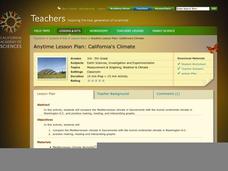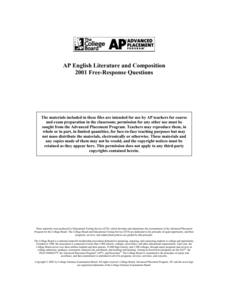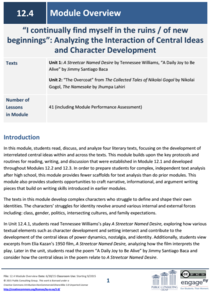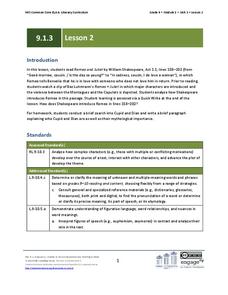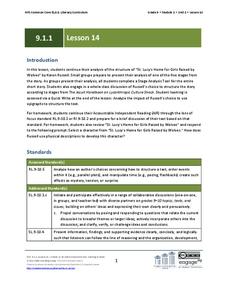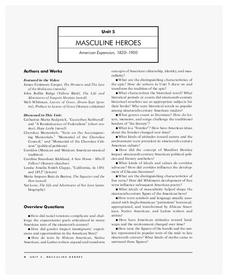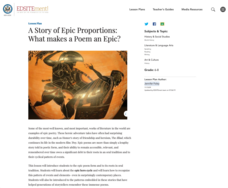Vanier College
Analyzing Short Stories/Novels
Good questions can help focus readers' attention on the elements writers use to add depth to their stories. The questions on this worksheet do just that and encourage readers to think critically about a story and author's purpose.
Curated OER
Express Yourself Lesson Seed 13: Character Development 2
Building upon prior lessons in the series, this reading and writing exercise requires pupils to look back at their own writing, track character development in the novel The Cay, and analyze how Phillip has changed. The reading focus is...
Curated OER
The Outsiders Study Guide
Provide this packet for your pupils as they pour over The Outsiders by S.E. Hinton. The study guide includes graphic organziers and comprehension as well as higher-level questions. Class members briefly summarize each chapter, compare...
CPALMS
Analyzing Vonnegut's View of the Future and His Commentary on the Present in Harrison Bergeron
Kurt Vonnegut's short story "Harrison Bergeron" engages adolescents with its theme about the dangers of complete societal equality. Learners complete a graphic organizer to track literary elements in the story, as well as an inference...
EngageNY
Analyzing Character: Who is Lyddie?
Character analysis can help readers feel more connected to a literary text. Scholars explore the topic by writing an acrostic poem about the main character from Katherine Paterson's novel, Lyddie. Then, pupils watch a short video to help...
California Academy of Science
California's Climate
The United States is a large country with many different climates. Graph and analyze temperature and rainfall data for Sacramento and Washington DC as you teach your class about the characteristics of Mediterranean climates. Discuss the...
College Board
2001 AP® English Literature and Composition Free-Response Questions
Do 100 years make a difference? Scholars compare two poems written 100 years apart. They also analyze characterization used in a passage from Tom Jones by Henry Fielding. A final essay question allows writers to choose a piece of...
EngageNY
Grade 12 ELA Module 4: Literary Analysis
Does identity come from within, or do external forces shape it? Explore the complex identity concept with a two-unit module for 12th-grade language arts. The first unit uses A Streetcar Named Desire by Tennessee Williams and "A Daily Joy...
EngageNY
Grade 9 ELA Module 1, Unit 1, Lesson 6
Can you tell everything about a character based on their actions? Delve into the prominent characters of Karen Russell's "St. Lucy's Home for Girls Raised by Wolves" with helpful reading tips and discussion questions. A thorough lesson...
EngageNY
Grade 9 ELA Module 1: Unit 3, Lesson 2
After viewing a clip from Baz Luhrmann’s Romeo + Juliet in which major characters are introduced, and the violence between the Montagues and the Capulets is depicted, the class reads Act 1, Scene 1, lines 158-202. Groups then analyze the...
Simon & Schuster
Classroom Activities for The Count of Monte Cristo by Alexandre Dumas
Alexandre Dumas' The Count of Monte Cristo is the featured text in three classroom activities. The first activity asks readers to analyze the description of Edmond Dantes in Chapter XVII, paying particular attention to Dumas' word...
National Endowment for the Humanities
Dostoevsky's Crime and Punishment
Pain and suffering do not have to be inevitable in a study of Crime and Punishment. A carefully scaffolded lesson plan introduces readers to the divided natures of the characters in Fyodor Dostoevsky's complex novel. Groups use...
Bantam Books
The Tempest: Think-Aloud Annotation
It can be difficult to refer back to a text when analyzing it, so annotation is a great tool for kids to track what they are reading. A thorough and well-organized lesson guides learners through the process of annotating William...
MENSA Education & Research Foundation
Magical Musical Tour: Using Lyrics to Teach Literary Elements
Language arts learners don't need a lecture about poetry; they listen to poetry every day on the radio! Apply skills from literary analysis to famous songs and beautiful lyrics with a lesson about literary devices. As...
PBS
Supernatural Shakespeare and Macbeth
"A drum, a drum! Macbeth doth come." The withered and wild witches of Shakespeare’s Scottish play launch an examination of the fantastical elements in Act I, scene iii, paying particular attention to the action, imagery,...
IPDAE
Themes in Short Stories
"What is the theme of this story?" The very question can spark fear in the minds of readers and incinerate confidence. Here you will discover an exercise that shows how writers use the tools of setting, plot, conflict, and...
National Endowment for the Humanities
Faulkner's As I Lay Dying: Concluding the Novel
As I Lay Dying is a beautiful book and a wonderful vehicle for understanding, interpreting, and comparing themes. The class reads and analyzes the novel, discusses possible interpretations, and characterizations. They compare the themes...
National Endowment for the Humanities
Lesson 1: The First Great Awakening
High schoolers examine the First Great Awakening and how it affected religious belief in colonial America. They read and analyze primary source documents, explore various websites, and write a five-paragraph essay examining the beliefs...
EngageNY
Grade 9 ELA Module 1, Unit 1, Lesson 14
Karen Russell's short story "St. Lucy's Home for Girls Raised by Wolves" has a unique structure that adds value to the story. With the fourteenth activity in a unit about literary analysis and textual support, analyze how Russell has...
College Board
2003 AP® English Literature and Composition Free-Response Questions
The released 2003 AP® exam asks scholars to read and respond to two poems about the love god Eros. They also analyze the characterization and narrative in The Other Paris. A final essay question requires pupils to choose a novel or play...
Annenberg Foundation
Masculine Heroes
What were the driving forces behind American expansion in the nineteenth century, and what were its effects? Scholars watch a video, read biographies, engage in discussion, write journals and poetry, draw, and create a multimedia...
National Endowment for the Humanities
A Story of Epic Proportions: What Makes a Poem an Epic?
Learners analyze the epic poem form and its roots in oral tradition. For this epic poetry lesson, students research the epic hero cycle and recognize the pattern of events and elements. Learners analyze the patterns embedded in the stories.
National Endowment for the Humanities
Folklore in Zora Neale Hurston's Their Eyes Were Watching God
Learners define folklore, folk groups, tradition, and oral narrative. They identify traditional elements in Their Eyes Were Watching God Analyze and understand the role of traditional folkways and folk speech in the overall literary...
Linda Hoyt and Lynnette Brent Sandvold
Point of View: The Outsiders
Incorporate these ideas for tracking point of view into your lessons for S.E. Hinton's The Outsiders. The resource provides ideas for talking about point of view at various points in the novel and provides a prompt for reflection. Also...





